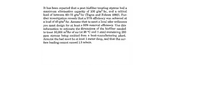Concept explainers
Question
It has been reported that a peat biofilter treating styrene had a maximum elimination capacity of 100 g/m3-hr, and a critical load of between 80-75

Transcribed Image Text:It has been reported that a peat biofilter treating styrene bad a
maximum elimination capacity of 100 g/m3-hr, and a critical
load of hetween 60-75 g/m³-hr (Togna and Folsom 1992). Fur-
ther investigation reveals that a 97% efficiency was achieved at
a load of 40 g/m-hr. Assume that to meet a local odor ordinance
you must design for at leaşt a 90% removal efficiency, Use this
information to estimate the dimensions of the biofilter needed
to treat 10,000 m/hr of air (at 30 °C and 1 atm) containing 200
ppm styrene being emitted from a boat-manufacturing plant.
Assume the bed must be at least 1 meter deep, and that the sur-
face Iouding cannot exceed 1.5 m/min.
Expert Solution
This question has been solved!
Explore an expertly crafted, step-by-step solution for a thorough understanding of key concepts.
This is a popular solution
Trending nowThis is a popular solution!
Step by stepSolved in 2 steps with 1 images

Knowledge Booster
Learn more about
Need a deep-dive on the concept behind this application? Look no further. Learn more about this topic, advanced-physics and related others by exploring similar questions and additional content below.Similar questions
arrow_back_ios
arrow_forward_ios